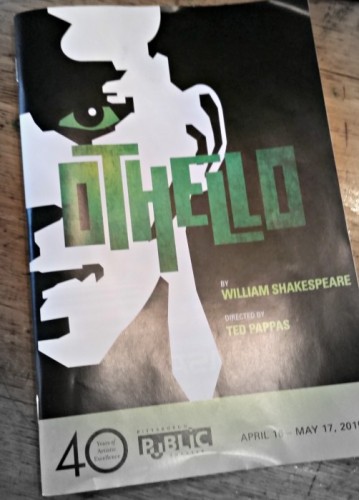 Othello by William Shakespeare
Othello by William Shakespeare Directed by Ted Pappas
In Othello, Shakespeare creates a powerful drama of a marriage that begins with fascination (between the exotic Moor Othello and the Venetian lady Desdemona), with elopement, and with intense mutual devotion and that ends precipitately with jealous rage and violent deaths. He sets this story in the romantic world of the Mediterranean, moving the action from Venice to the island of Cyprus and giving it an even more exotic coloring with stories of Othello's African past. Shakespeare builds so many differences into his hero and heroine—differences of race, of age, of cultural background—that one should not, perhaps, be surprised that the marriage ends disastrously. But most people who see or read the play feel that the love that the play presents between Othello and Desdemona is so strong that it would have overcome all these differences were it not for the words and actions of Othello's standard-bearer, Iago, who hates Othello and sets out to destroy him by destroying his love for Desdemona. As Othello succumbs to Iago's insinuations that Desdemona is unfaithful, fascination—which dominates the early acts of the play—turns to horror, especially for the audience. We are confronted by spectacles of a generous and trusting Othello in the grip of Iago's schemes; of an innocent Desdemona, who has given herself up entirely to her love for Othello only to be subjected to his horrifying verbal and physical assaults, the outcome of Othello's mistaken convictions about her faithlessness.
David, Amber, my mom and I saw Othello performed at the O’Reilly Theater in Pittsburgh this past Saturday. I really enjoyed the performance, and the play. Watching the play live, being performed by quality actors, including Jeremy Kushnier, who’s Iago was creepy and conniving and just outstanding, is so entirely different from reading the words. Kushnier really was the star of the show. Amber wanted to know why, if Iago is one of the best fictional villains, she’s never heard of him. My response was, she’s 15, there are probably many things she hasn’t heard of. The play was performed on a small square stage with a minimalist setting that allowed me, at least, to concentrate on the story being presented. The play is definitely for adults – full of racism, sex and violence, but it’s entertaining and easy to follow. I asked Amber if she understood it and she said that she had been a little worried beforehand but when she got into the swing of it, she realized “I got this.” I did give David and her a very brief plot synopsis at lunch beforehand. I’m kinda hoping she didn’t get all of it – it’s a bit lewd – but seeing Shakespeare performed live should be required for high school students. I really like the O’Reilly too. It’s a “thrust” stage, with the audience on three sides and it’s small, only 650 seats, a great theater to watch a play like this one.
I lived your conversation with her about it.
I think Shakespeare is best experienced on stage, just as it was intended, and agree it should be required if you are required to actually read Shakespeare. This isn’t one of my favorite of his plays bu Iago remains one of my all-time favorite (ifthat is the right word!) villains.